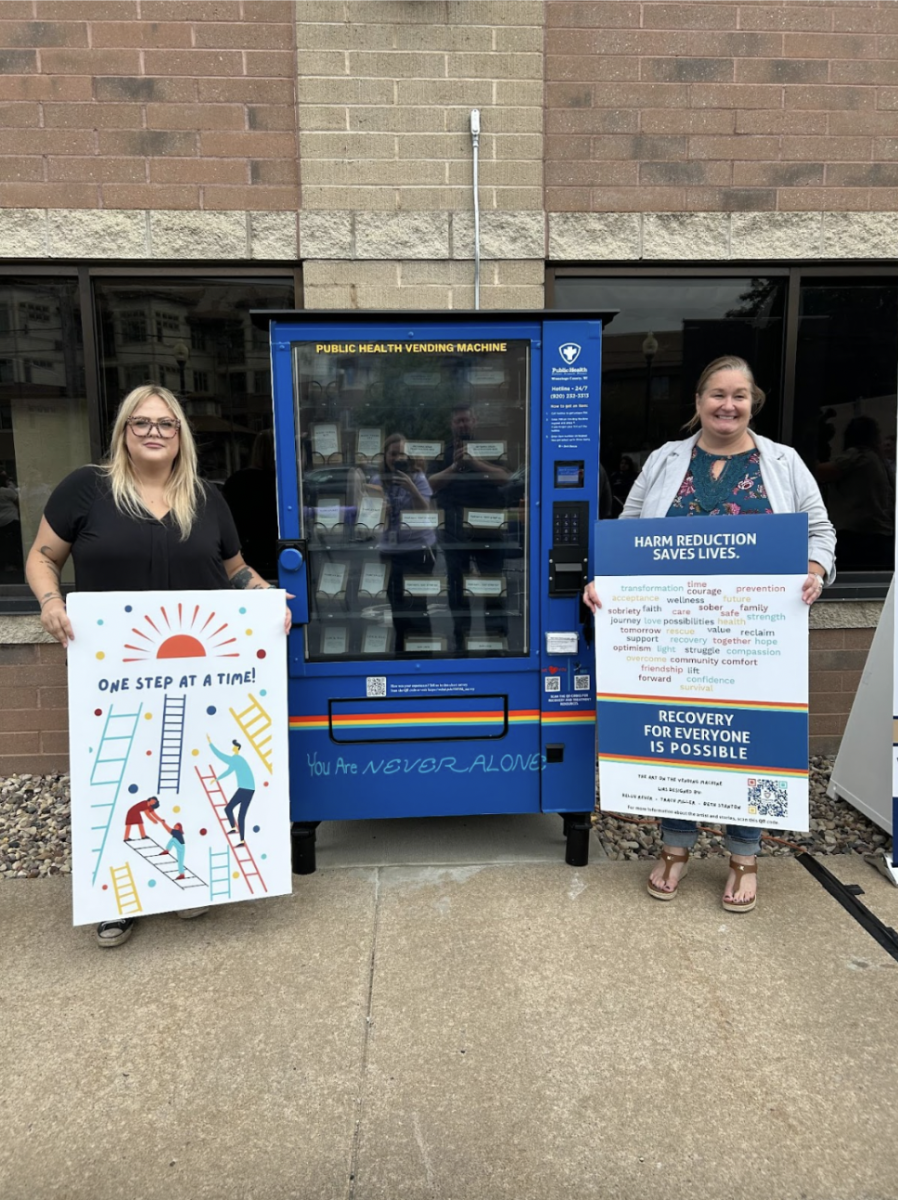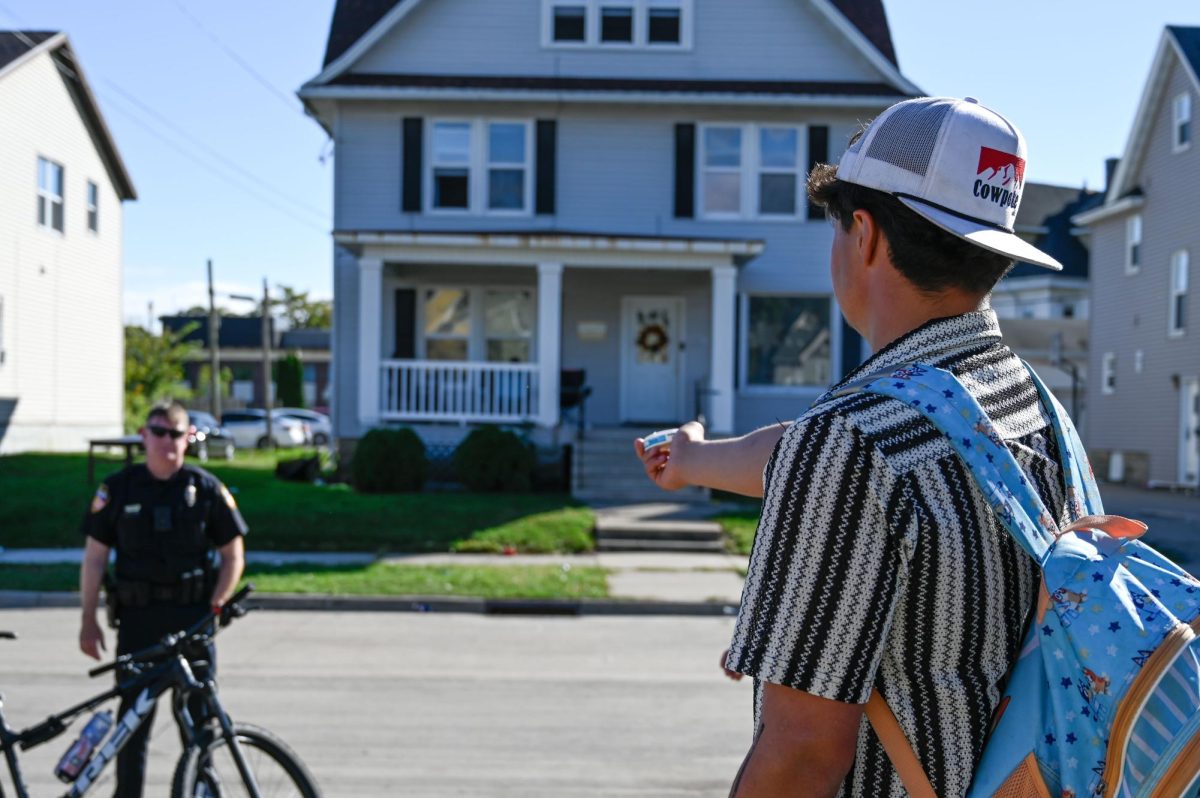The Winnebago County Public Health (WCPH) agency recently unveiled new free resources for the community in the form of vending machines, available in Oshkosh and Neenah.
The 24/7 public health vending machines feature substance-related tools for everyone, including nasal Narcan, DETERRA drug deactivation kits and fentanyl test strips. Other resources available include lock bags, gun locks and feminine hygiene products and basic needs kits.
“There are safe, effective and lifesaving tools available to help people struggling with substance use,” WCPH Community Health Specialist Maddie Breager said. “These vending machines are one of the ways we are [able] to get … lifesaving tools available to anyone who needs them.”
Oshkosh’s vending machine is located at 112 Otter Ave. outside of the David W. Albrecht Administration Building. Neenah’s is found outside of the Winnebago County Human Services Building at 211 N Commercial St. For students at UWO, Oshkosh’s machine is about a 20-minute walk from campus.
“These vending machines are the first in the Fox Valley and surrounding areas to be outdoors,” Breager said. “Being outdoors allows 24/7 access to life-saving tools [and] both vending machines are near a bus route and produce heavy foot traffic.”
Breager added that every item is found in a brown box with a white label, making the resources discreet for users.
“No matter if someone is getting Narcan, tampons or a gun lock, it all looks the same,” she said. “No one should feel ashamed for seeking safe, effective and lifesaving tools.”
Users must input a PIN code in order to access the resources in the machine. People can obtain a PIN code by calling 920-232-3313, available 24/7, or by visiting the Winnebago County Human Services Building in Neenah Monday through Friday from 8 a.m. to 4 p.m.
“This PIN code will be active for 90 days of use to a client,” Breager said. “These [machines] are both confidential and anonymous, with no strings attached.”
Breager mentioned that these vending machines will help expand WCPH’s reach across Winnebago County with these resources available around the clock. She said that “overdoses don’t just happen during office hours,” noting that Oshkosh’s Lifepoint Harm Reduction program is only available from 8 a.m. to 4 p.m. Monday through Friday.
“Our goal is to reduce barriers to access to public health prevention items so that people don’t feel embarrassed about the fact that they have a loved one who’s struggling or doesn’t know how to get prevention items or how to afford the cost,” Breager said. “We aim to promote wellness, reduce harm and prevent death or serious injury.”
She knew that adding these vending machines was necessary for the area after Winnebago County reported a record high overdose deaths last year.
“In 2023, 47 people died of an overdose in Winnebago County,” WCPH Director/Health Officer Doug Gieryn said in a press release. “Each of those deaths has long-term implications for the person’s friends, family and the overall community. The [vending machines] are aimed at preventing death as increasing access to Narcan and fentanyl test strips is one of the most effective tools available to combat the opioid epidemic.”
Breager noted that chronic substance use disorders can be treated, but public views towards substance abuse limit people getting the help they need.
“Studies have shown people with these disorders still face discrimination and stigma that can impact their health and well-being in numerous ways,” she said. “This stigma often factors into the reasons why people who need help do not seek care.”
According to Breager, the vending machines provide an easy way for people to access the resources they need. The machines were made possible by a $80,000 grant awarded to WCPH from the Wisconsin Department of Human Services, with the money coming from Wisconsin’s $400 million opioid settlement.
“We saw the grant from the Department of Health Services and knew this was something we wanted to apply for,” Breager said. “[We knew] this tool could help so many people.”
WCPH officially unveiled their new vending machines during an event on Sept. 20, which featured discussion and a demonstration of the machines.
“The event went very well!” Breager said. “We [had] a great turnout from elected officials, the community and local organizations that support those who use substances.”
For the event, WCPH held a community design contest from June to July for artwork to be featured on the machines. The theme for the designs included representing WCPH’s values along with including how “Harm Reduction Saves Lives.”
Breager noted that the objective of the contest was to “reduce stigmatization of people with substance use disorders through art,” and that various forms of art were accepted in the contest from the community.
“Substance use is often dark and painful,” she said. “This was one way to create a more positive light around substance use and these vending machines.”
Breager reiterated that harm reduction saves lives, and that WCPH believes that recovery for everyone is possible.
“We want people struggling with substance use disorder to know they are not alone, we care about them and we want them to be safe,” she added. “Decreasing the stigma of substance use disorder is vital to keeping people alive.”















